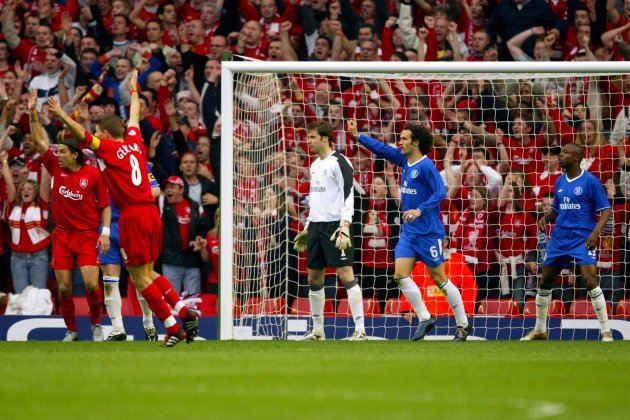IT IS OFTEN said that certain communities of people don’t get the leaders they want, they get the leaders they deserve. However, the world of football represents an anomaly – it simply doesn’t get the leaders it deserves.
A combination of its numerous exemplary athletes, its accessible nature and the series of ingenious marketing campaigns its promoters have instigated over the years have led it to become (by most analysts’ accounts) the most popular sport in the world. Yet for all the fervour it evokes, those who run the game remain mired in widespread allegations of corruption and incompetence.
To say that FIFA and UEFA have a bad reputation at the moment would be an understatement. Over the years, claims of under-handedness have dogged the former organisation, while Michel Platini and co have hardly done much to restore the credibility of football’s authorities.
Yesterday was a historic day as far as both these organisations were concerned for two reasons: namely, goal-line technology was officially introduced for the first time and second, it was announced that UEFA had opted to press forward with their long-discussed idea to hold Euro 2020 across multiple European cities, rather than restricting the location to one or two countries, as is normally the case.
There were differing reactions among the footballing community to these two separate pieces of significant information – the goal-line technology news was greeted with an overriding sense of relief, while the Euro 2020 story was met, for the most part, with considerable skepticism.It was not the first time the choice to host a tournament in a particular location made by one of the sport’s governing bodies was regarded as controversial in the extreme. The decision to award the 2022 World Cup to Qatar was treated with equal disdain by an abundance of interested parties, given the country’s lack of a footballing background and the excessive heat in which tournament games there are likely to take place.
Similarly, the Euro 2020 decision seems highly inconvenient for the fans – the people whose best interests UEFA and FIFA supposedly have at heart – who could conceivably be forced to travel exorbitant distances in small spaces of time in order to watch their country play. In addition, the quintessential tournament ambience will inevitably be sorely lacking at Euro 2020. There won’t be many well-known communal areas for various teams’ fans to congregate, like there tends to be under normal circumstances, as they’ll likely be moving around all the time. The tournament will thus lack a discernible cultural identity, and so will, by most accounts, become a poorer experience as a result.
Yet despite the ostensible foolishness of this decision, it seems relatively minor compared with the longstanding debacle over goal-line technology. For years, FIFA have rejected the idea of introducing it to the sport, providing flimsy excuses in the process – the ridiculous notion that measures which can’t be adapted in park football shouldn’t be implemented in the professional game is a prime example.
Granted, following a series of high-profile incidents, FIFA have finally relented, with goal-line technology being used officially for the first time yesterday.
(Liverpool’s Milan Baros and Steven Gerrard appeal for the opening goal [scored by Luis Garcia] as Chelsea’s Petr Cech, Ricardo Carvalho and William Gallas stand dejected in the Champions League semi-final a few years back – Mike Egerton/EMPICS Sport)
Nevertheless while we all remember the Luis Garcia ‘goal’ that never was, and the Pedro Mendes strike that should have been, will goal-line technology’s arrival prompt that much change in the game? Incidents such as the infamous Mendes case are, ultimately, quite rare, and are often judged correctly by the officials anyhow.
However, though this latest measure should still be welcomed to an extent as an indication that football’s governing bodies are at last willing to embrace change, the question remains as to whether it will make the lives of referees that much easier in the long run. The answer, surely, is no.
Recall all of the most notorious and high-profile contentious decisions made by referees in recent years, and statistics will illustrate that the vast majority would not have been improved by goal-line technology.
The famous Thierry Henry handball incident against Ireland would have still gone unseen, and Tom Henning Øvrebø’s controversial decisions in that much-discussed 2009 Champions League semi-final between Barcelona and Chelsea would also have stood.So, while goal-line technology is important in terms of its symbolic significant, it is unlikely to be especially influential.
So what would be the alternative solution? A situation similar to rugby, where the referee consults his video official for crucial, borderline decisions, seems a highly credible suggestion.
Yet critics rightly argue that an implementation of this scheme could potentially make the game painstakingly slow and decidedly unexciting too watch. Therefore, it seems fair that the rugby method should be combined with the system in tennis, whereby each player can dispute a maximum of three of the official’s decisions.
Accordingly, in football, it should be the manager’s responsibility to ask for the referee to consult the video official on a maximum of three occasions per game, whenever they feel their team has been wronged. Such a system would not slow down the game unduly, and would mean critical calls invariably wouldn’t hinge solely on the split-second decision of one individual.
This idea seems entirely logical and as close to flawlessness as possible, given that it would undoubtedly cause a major reduction in the amount of bad decisions made by referees, helping justice to prevail on a far more regular basis in the footballing world. In comparison, goal-line technology may help occasionally, though it will doubtless have a minimal effect on games in general. And not only is the alternative more efficient, it would also be vastly cheaper to adopt.
Of course, this rugby/tennis-inspired concept has been mentioned before on occasion, unsurprisingly, as it’s the most obvious solution to the unreasonable levels of pressure that referees are expected to cope with in the game’s modern era. And perhaps a greater clamour for its introduction will arise once people acknowledge goal-line technology’s inevitably limited impact.
Nonetheless, judging by the rate at which FIFA normally operate, we’ll be lucky to see such a system in place anytime this century – unless football finally does get the leaders it deserves.


